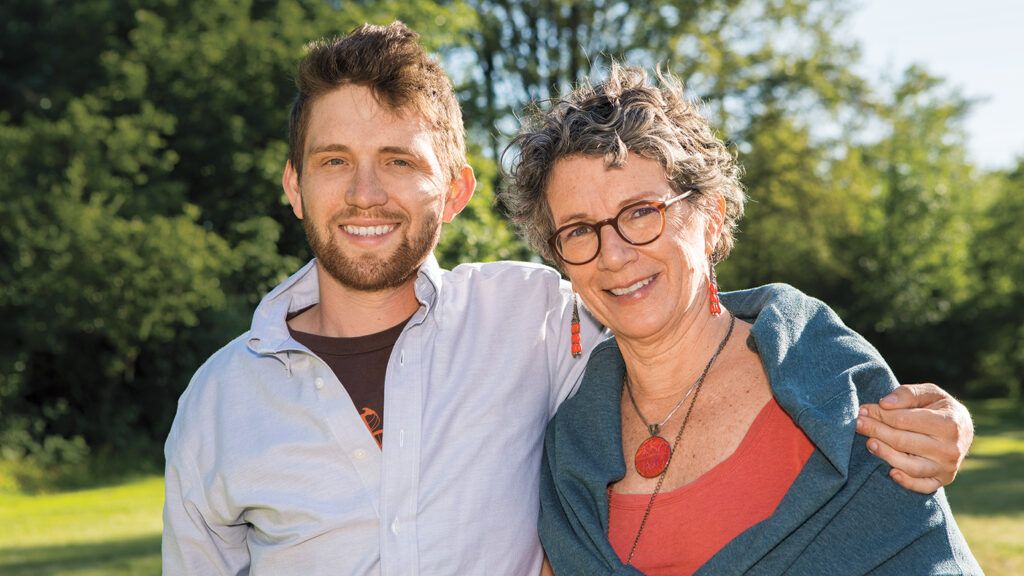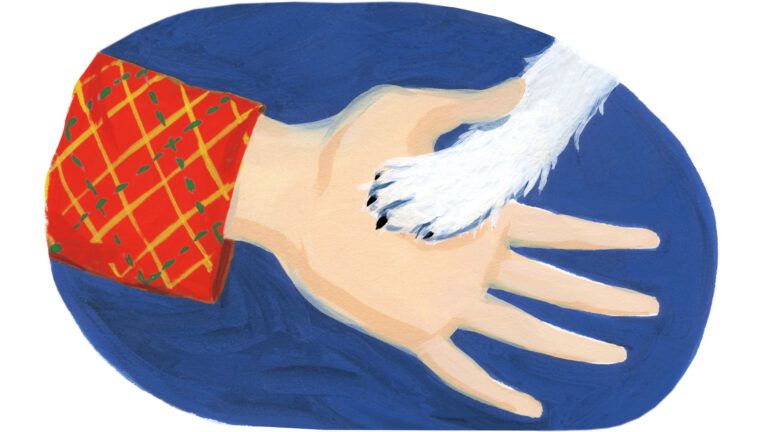I walked alongside the gurney, gripping my 22-year-old son’s hand. The orderly stopped me at the operating room doors. “This is as far as you can go,” she said. I leaned over and kissed Spencer’s forehead. “I love you, Spoon.”
“I love you too,” he whispered back. I watched helplessly as he was wheeled away from me. Would I ever see my boy alive again?
Four weeks earlier, my strapping mountain biker son had suffered a stroke while he was camping with friends in Canada. He ended up being airlifted to Harborview Medical Center in Seattle, and I arrived from my home in San Diego the next morning. Spencer was asleep when I got there, his limbs anchored to the bed rails by restraints. When I touched his cheek, his eyes opened but he gave no sign of recognition.
That afternoon, Spencer would intermittently wake and talk gibberish. “I’m going to buy a goat farm,” he announced to his dad, Steve, who’d driven from Bellingham, Washington. Steve and I had divorced years ago. I laughed nervously at these outbursts, stroking Spencer’s long curly locks until he drifted back to sleep. Then without warning, he jerked upright, pulled free of his restraints and ripped out his IV.
He was having a seizure. It took four of us to hold him down, the nurse shouting for a crash cart. Dr. Louis Kim, Spencer’s neurosurgeon, arrived and told us that Spencer had suffered a second cerebral hemorrhage. After an emergency craniotomy to relieve pressure caused by the bleeding in his brain, Spencer fell into a coma.
Those first few days, I asked questions of every member of the medical staff who entered the room. Hundreds of questions. I researched everything I could find about Spencer’s condition on my iPhone. I didn’t leave his side. I didn’t sleep. I barely ate. One nurse took me aside. “Remember the wisdom of the flight attendant,” she said. I gave her a puzzled look. “You must put on your own oxygen mask before helping others with theirs.” Something clicked in my head: I couldn’t keep up my bedside vigil for the long haul. I couldn’t simply will my son to live, a revelation that brought equal parts relief and despair.
I asked family and friends to take shifts with Spencer. His older brother, Stuart, flew in from California, and a flurry of college buddies camped out in the neuro-ICU lounge. One of them stood next to his bed for an hour recounting every detail of their favorite bike trail for a comatose Spencer. At long last, I took a friend up on the offer to stay in her apartment downtown. I forced myself to spend a few nights there, even though I couldn’t really sleep. I didn’t know what to do with my “time off.” I tried walking to Pike Place Market or numbly roaming the Seattle Art Museum, indifferent to works that once would have moved me.
I did find an old-school Italian restaurant that was a welcome respite from the hospital cafeteria food. One evening, as I was walking back to the hospital from the restaurant, it started pouring. I didn’t have an umbrella. I ran to take shelter in the nearest building, the imposing St. James Cathedral. Although I had been raised without religion, my mother was a lapsed Catholic. I remembered as a child asking her why she still kept her rosary. “Even though I don’t go to church,” she said, “I sometimes feel the need to pray when bad things happen.”
“Can you show me how to pray?” I asked her.
“Wait for a scene to come to life in your imagination, then begin your prayer,” she told me.
Now, drenched to the bone, I knelt in a back pew of the cathedral and did as she had instructed. The air was cool and smelled of candle wax. I emptied my mind and waited for a scene to emerge: Spencer on his mountain bike “ripping” down the face of a snowcapped mountain. “God, if it is your will, please allow Spencer to have these adventures again,” I said. I rested my head on my folded hands and let the hush of the sanctuary wash over me. Ever so perceptibly, I felt a weight begin to lift.
On Day 14, Spencer emerged from his coma but was in the throes of what’s called ICU delirium—confusion linked to long hospital stays. In many ways, it was scarier than the coma, as if the son I knew was gone. Dr. Kim asked to meet with our family. “You have a decision to make,” he told us as we gathered in a corner of the ICU. Spencer’s strokes were caused by the rupture of a cluster of veins deep within his brain. So deep that removing the veins would entail cutting through brain tissue that controlled vital functions, including memory.
Dr. Kim explained that removing the cluster would eliminate the possibility of future strokes but that the surgery was extremely risky. There was a chance Spencer might not even survive. If he did, he might never be able to walk again or even function independently. Our options were either to let Spencer recover to whatever degree possible but with the lifelong risk of more—possibly fatal—brain hemorrhages or let Dr. Kim operate.
Dr. Kim allowed this information to sink in. We were silent for a long time.
“What would you do if this were your child?” Spencer’s dad finally asked.
“I’d do the surgery,” Dr. Kim replied. That made up Steve’s mind.
“What are the chances of complications?” I asked.
“You’ll go crazy trying to figure that out,” Dr. Kim counseled. “It’s the future, and unfortunately none of us can predict it. We’ll never know more than that until we go through with it.”
I didn’t know if Dr. Kim was a man of faith, but that was exactly what he was asking me to take: a leap of faith. But first I went to the hospital chapel to pray. I closed my eyes and waited for a scene. This time I saw Spencer as a towheaded toddler frolicking in the ocean surf, without a care in the world. This vision of him unburdened was so powerful that I said yes to the surgery. I felt certain that this procedure was Spencer’s only chance to return to a full life.
Now after I kissed my son on the forehead and watched him being wheeled into the operating room, the panic of second-guessing set in. I wondered how I could have let him go. Was it the right decision? Almost paralyzed by fear, I walked down the hallway, the longest walk of my life, each step taking me farther and farther away from my son. Eight of us gathered in the hospital cafeteria to wait out the operation. We made small talk and bought round after round of coffee. After almost seven hours, a wan Dr. Kim appeared, still in surgical scrubs. His expression was unreadable.
“The surgery was a success,” he said. “However, we won’t know the extent of possible brain damage until Spencer begins to recover.”
Soon Spencer was brought back to his room. A pronounced S-shaped scar traversed his skull. Over the next several days, we kept watch at his bedside as he slept on and on. I tried to pray, to picture scenes of Spencer hiking through dense forests. Spencer snowboarding. Two weeks after the surgery, one of Spencer’s favorite songs, “Arabella” by Arctic Monkeys, was playing on the Bluetooth speaker in his room and his lips began to move.
“Are you singing?” I asked.
He opened his eyes, gave me a great big smile and said, in the raspiest, most beautiful voice ever, “Yeah!”
In the coming weeks, Spencer was able to stand, then take his first wobbly steps with help. Finally, holding tight to a walker, he made his way down the ICU hallway to the rousing applause of staff members. Dr. Kim moved Spencer to the rehab unit of the hospital, where he relearned life’s simplest tasks—showering, brushing his teeth, writing his name. Though his progress was steady, Spencer’s fine motor skills were compromised, he walked with a limp and, above all, his memory had not recovered as we’d hoped.
Fortunately, he still recognized his friends and family. He could remember everything about his prestroke life, but his short-term memory was nonexistent. He couldn’t remember what he’d had for lunch or who’d visited him earlier in the day. In late October, 56 days after he’d been admitted, Spencer was discharged from Harborview and came to San Diego to live with me.
We were able to get him enrolled in one of the top brain injury day programs in the country. Spencer was assigned to physical, occupational, speech and mental health therapists and a neurologist who specialized in brain injuries. But even with this dream team, after seven months, his case manager pulled me aside, a sheaf of doctors’ reports in hand. I held my breath, waiting for the news. “Spencer probably won’t ever be the same,” she told me. “We’ve exhausted our bag of tricks, and it’s time to discharge him.”
I couldn’t believe it. My beloved son would never fully return? I drove to a nearby beach. I perched on a rock and closed my eyes, just as I once had in the cathedral, waiting for a scene to come to life. This time, all I saw was my own clenched fist. What was the message? That I was desperately holding on to the old Spencer? That I still hadn’t learned to let go? To allow God to take care of Spencer? Moving toward acceptance of the new Spencer had always felt like a betrayal. I’d fought and fought against it. Against the facts. Against reality. Against God. But my son was in his hands, not mine.
Later that day, on our drive home from the rehab program, I asked Spencer, as I did every day, “What did you have for lunch?”
“Chicken tenders and a cookie,” he answered, without missing a beat.
I pulled the car over to the curb and began to cry.
Startled, he asked, “What’s wrong, Mom?”
“Today is the first day you remembered what you ate for lunch.”
Spencer broke into a crooked smile. “Well, there is that to hold on to,” he said.
Two years have passed since Spencer’s surgery. Surpassing all his doctors’ expectations, he has returned to college in Bellingham, where he lives with his dad and his emotional support dog, Moon. He’s ripping mountain trails again with his friends. He is every bit the son he’s always been and more.
I had finally learned to let go, with God’s help. Spencer was right: There is that to hold on to.
For more inspiring stories, subscribe to Guideposts magazine.





